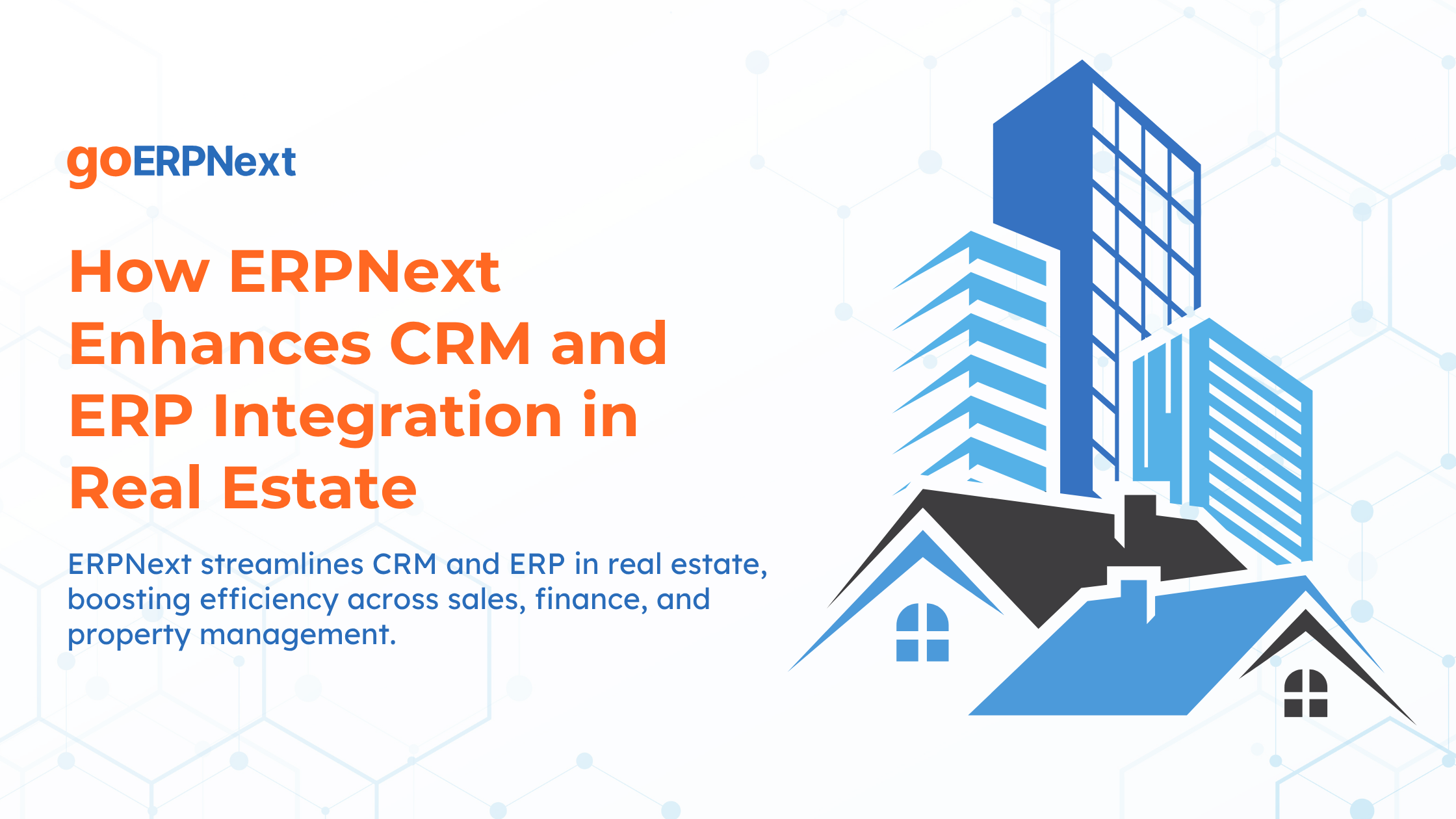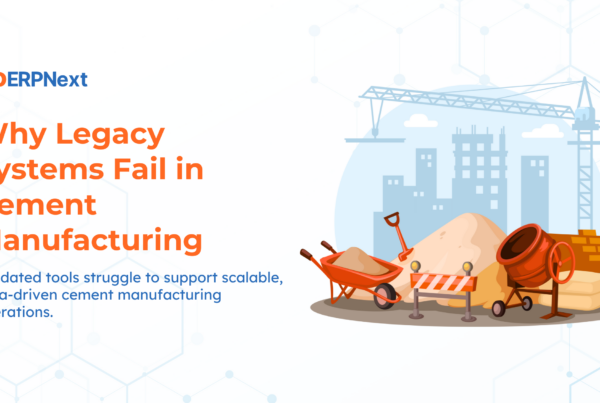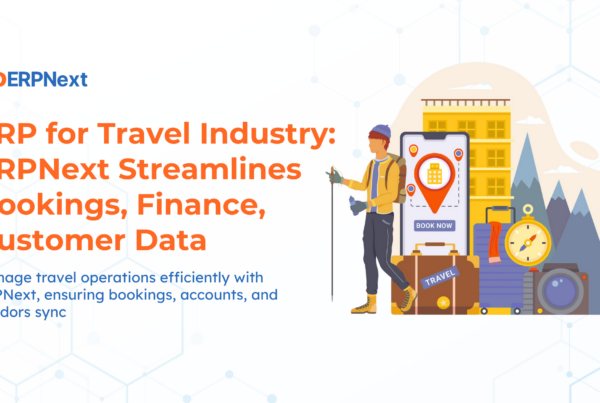
Introduction
The real estate industry has long faced challenges in managing customer relationships, sales pipelines, property inventory, documentation, and financial operations. Traditionally, these functions have been handled in silos — customer relationship management (CRM) on one end and enterprise resource planning (ERP) on the other. This lack of integration often leads to inefficiencies, missed opportunities, and a fragmented view of business performance.
ERPNext, a modern open-source ERP platform, solves this by offering seamless CRM and ERP integration for real estate companies. From lead acquisition to project handover and post-sales service, ERPNext centralizes all operations, helping businesses improve visibility, automate tasks, and enhance customer engagement — all within a single, unified system.
Why CRM and ERP Integration is Crucial in Real Estate
Real estate is a relationship-driven business where every inquiry, follow-up, and client interaction matters. Meanwhile, backend operations like inventory, accounting, legal documentation, and project scheduling demand precision and coordination.
Here’s why CRM-ERP integration is essential:
- Provides a 360-degree customer view
- Streamlines communication between sales and operations
- Automates repetitive manual tasks
- Reduces data duplication and human error
- Speeds up deal closures and improves customer satisfaction
ERPNext for real estate developers offers an out-of-the-box solution that unites CRM and ERP functions into a cohesive, real-time platform.
Key Features of ERPNext That Enhance CRM and ERP Integration
1. Lead Management and Sales Pipeline Automation
With ERPNext CRM for real estate, every lead from email, website forms, campaigns, or offline sources can be automatically captured and categorized. Sales teams can:
- Set follow-up reminders
- Assign leads based on location or project
- Qualify prospects through custom stages
- Get real-time updates on conversions
The integration ensures that once a lead becomes a customer, their data flows directly into sales orders, property allocations, and invoicing — without redundant entries.
2. Property Listings and Inventory Control
Managing multiple properties, units, and projects becomes easier with ERPNext’s real estate property management features. You can:
- Create detailed property master records
- Link each property to a project, location, and developer
- Track availability, bookings, and sold status in real-time
- Automatically update inventory based on sales activities
This integration ensures the CRM module reflects real-time availability, empowering sales reps with accurate information during client discussions.
3. Quotation and Booking Automation
Sales teams can instantly generate quotations, booking forms, and agreements directly from lead or opportunity records. ERPNext’s powerful template system allows:
- Dynamic pricing based on location, floor, or amenities
- Auto-application of discounts or taxes
- Electronic signatures and document sharing
The bridge between real estate CRM and ERP software eliminates errors and speeds up deal finalization.
Streamlined Customer Journey from Inquiry to Possession
ERPNext supports an end-to-end customer journey by integrating the following stages:
- Lead Capture
- Site Visit Scheduling
- Property Shortlisting
- Quotation & Negotiation
- Booking Confirmation
- Documentation & Agreement Generation
- Payment Scheduling & Tracking
- Possession & After-Sales Service
Each step is automatically tracked, recorded, and updated across the CRM and ERP layers — enhancing transparency and collaboration between departments.
Benefits of ERPNext CRM-ERP Integration in Real Estate
- Real-Time Data Synchronization
All customer and project data are updated in real-time across modules — eliminating miscommunication and outdated information.
- Improved Sales Forecasting
Sales managers can view performance dashboards, funnel metrics, and win/loss ratios with integrated CRM analytics — improving strategy and forecasting.
- Financial Integration
Once a deal is closed, the ERP module for real estate automatically generates sales invoices, tracks receivables, and links payment schedules to customer records. This bridges the gap between sales and finance teams.
- Project-Wise Performance Tracking
Whether it’s one property or multiple projects across cities, ERPNext offers consolidated reports to monitor:
- Sales velocity
- Revenue realization
- Inventory turnover
- Customer feedback
Enhancing Customer Experience with Automation
With automation features, ERPNext helps real estate businesses deliver a more professional and responsive customer experience:
- Automated emails on inquiry registration, site visit scheduling, or payment reminders
- Task assignments to agents or CRM executives
- WhatsApp/SMS integration for instant communication
- Ticketing system for handling post-sales service requests
These small efficiencies add up to better service, higher satisfaction, and increased client retention.
Case Example: Simplifying a Multi-Unit Residential Project
Consider a residential complex with 100+ units across three towers. Using ERPNext for real estate CRM and ERP integration, you can:
- Set up project and property hierarchies
- Track leads by interest in tower/block/unit type
- Send targeted offers or updates
- Automate agreements and payment schedules
- Generate project-specific revenue and booking reports
All of this is handled in a single platform, drastically reducing the need for third-party tools or manual tracking sheets.
Scalable and Customizable for Growing Real Estate Firms
As companies scale from handling a few properties to hundreds of listings, ERPNext scales too. Its open-source nature allows:
- Custom workflows for approvals, bookings, and payments
- Role-based access for sales, marketing, legal, and accounts teams
- Localization for taxes, legal formats, and documentation
- Integration with third-party platforms like real estate portals, payment gateways, and digital signing tools
This makes ERPNext one of the best ERP software for real estate companies in India and globally.
Conclusion
In a competitive and customer-centric market like real estate, integrating CRM and ERP is no longer a luxury — it’s a necessity. ERPNext simplifies this integration with a robust, flexible, and feature-rich platform that centralizes operations, improves sales outcomes, and enhances the customer experience.
By adopting ERPNext for real estate CRM and ERP integration, businesses can eliminate inefficiencies, reduce overhead, and scale operations confidently — all while keeping the customer at the center of every decision.


